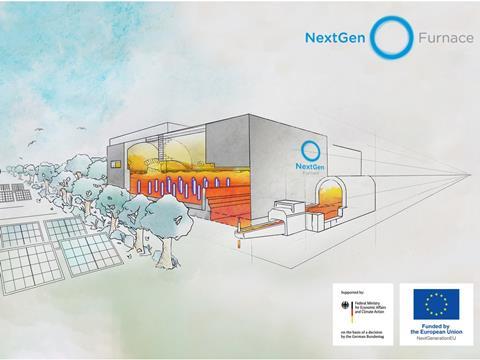
Ardagh Glass GmbH has announced that its ‘NextGen’ hybrid furnace – anticipated to reduce CO2 emissions at its Obernkirchen glass production facility by as much as 60% through a transition to renewable energy – is under construction.
The large-scale furnace claims that it will run on around 80% renewable electricity and 20% gas, as opposed to its estimation that current container glass production runs on 90% gas and 10% electricity. It claims to be the first facility of its kind to run mostly on renewable energy and hopes to reduce the carbon footprint of glass packaging.
Projected to commence operations later this year, the furnace is expected to produce 350 tonnes of glass bottles every day, predominantly in amber glass, using high levels of recycled glass cullet.
“Decarbonisation is a key priority for our business and our customers,” says Martin Petersson, CEO of Ardagh Glass Packaging – Europe. “The NextGen Furnace represents a significant investment in creating a sustainable future for glass packaging, and we intend to roll-out this and other low carbon solutions across other AGP facilities in the coming years. We are grateful for the grant support provided by BMWK and KEI which is helping to realise the benefits of this new technology.”
Sustainability director Annelene Ikemann continues: “AGP is a leading supplier of sustainable, infinitely recyclable glass packaging. Our NextGen Furnace, in combination with our target to supply 100% renewable electricity to our facilities by 2030, is a positive step forward along our Sustainability Roadmap.
“In future phases of this project, AGP aims to replace the remaining gas with green hydrogen, which will further reduce greenhouse gas emissions. In subsequent steps on our sustainability journey, we will look at a wider range of alternative melting technologies as we decarbonise our other facilities.”
The furnace’s sustainability credentials are hoped to contribute towards Ardagh’s 2030 Sustainability Strategy and its overall goal of decarbonisation.
The announcement comes after that of the ‘Efficient Furnace’, which will be built in Doncaster and aims to lower both carbon emissions and gas consumption.
Similarly, the construction of a new furnace was revealed by Encirc and Diageo late last year; this facility is anticipated to provide a 90% reduction in carbon emissions and offset the rest with carbon capture technology.
If you liked this article, you might also enjoy:
McKinsey on whether or not on-pack sustainability claims affect consumer spending
A deep dive into the most important packaging sustainability trends and solutions














No comments yet